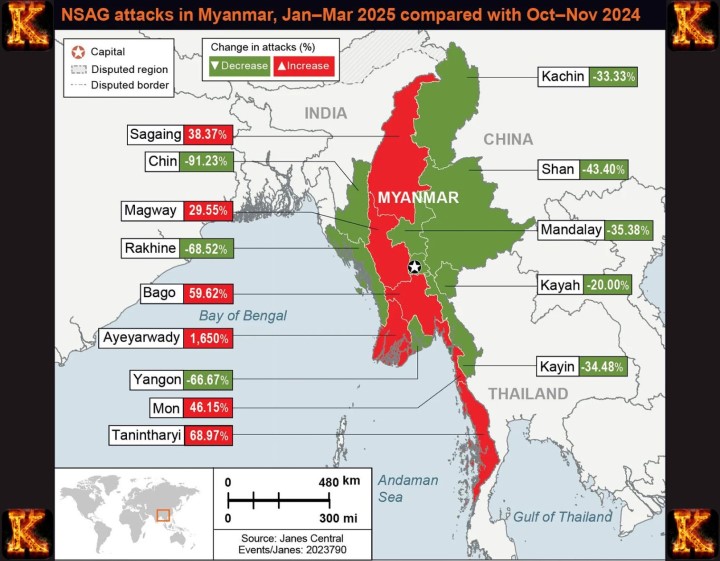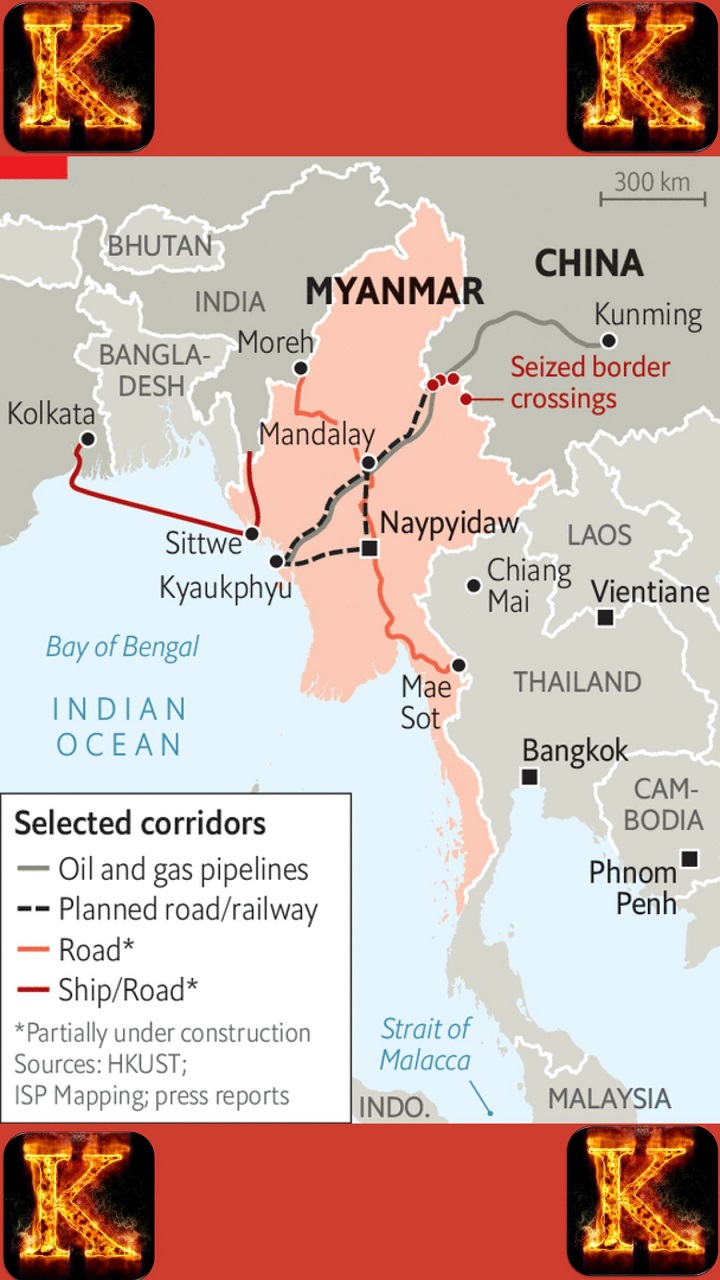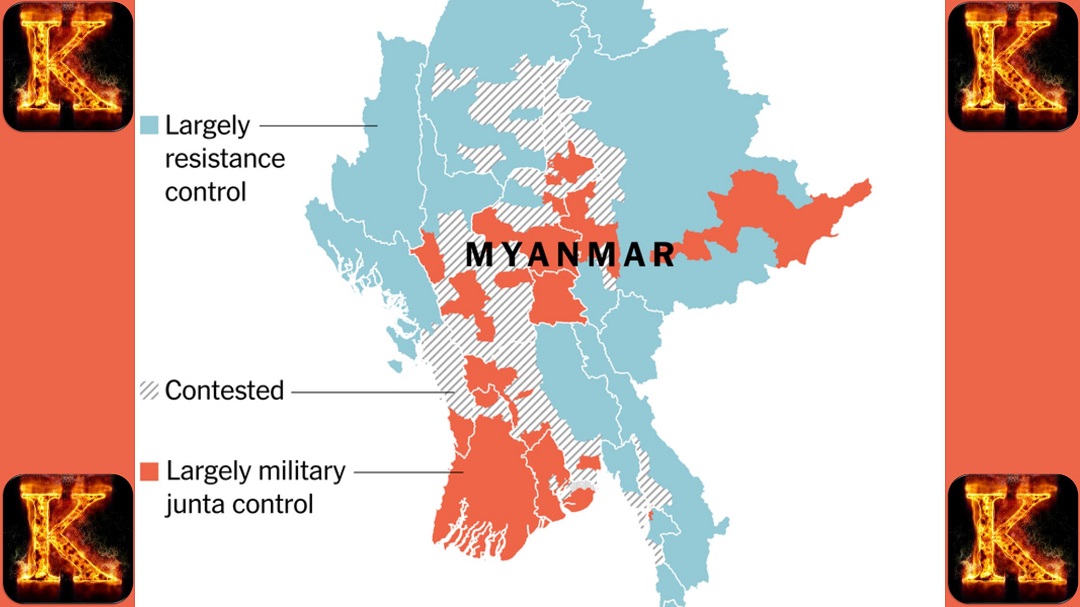Introduction
China’s role in the Myanmar civil war has become a defining issue in Southeast Asian geopolitics and a key test of China–Myanmar relations. Following the 2021 military coup, Myanmar entered a prolonged internal conflict involving the Myanmar military, known as the Tatmadaw, the opposition National Unity Government, and multiple ethnic armed organizations. As violence has intensified, questions surrounding China and Myanmar war dynamics have gained regional and international attention, particularly regarding China’s strategic intentions and long-term influence.
Understanding China’s role in the Myanmar civil war requires close analysis of its political, economic, and security interests, especially along the China and Myanmar border. Rather than offering unconditional support to a single faction, China has pursued a pragmatic approach that allows it to engage multiple actors while protecting its strategic priorities. This approach reflects China’s desire to preserve regional stability, safeguard cross-border security, and ensure continuity of major infrastructure and trade projects.
Historically, China–Myanmar relations have been shaped by both cooperation and strategic caution. Beijing has maintained engagement with successive governments in Myanmar while also cultivating ties with influential ethnic armed organizations operating in border regions. This pattern aligns with China’s broader foreign policy emphasis on non-interference combined with strategic influence. Through diplomatic engagement, economic investment, and selective mediation, China seeks to shape the trajectory of the China-Myanmar civil war without direct military involvement.
This analysis examines China’s interactions with the Myanmar junta and ethnic armed groups, its role in conflict management efforts, and its broader geopolitical objectives, offering insight into how China’s actions continue to shape the course of the Myanmar civil war.
China’s Strategic Position in the Myanmar Civil War
Strategic Balancing Rather Than Direct Alignment
China’s role in the Myanmar civil war is defined by strategic balancing rather than explicit support for a single faction. Since the 2021 coup, Beijing has officially promoted dialogue and political stability while carefully engaging multiple actors within Myanmar’s fragmented conflict landscape. This approach allows China to preserve leverage regardless of shifts in military or political power. Rather than committing to regime change or opposition support, China prioritizes predictability and influence. This strategy is consistent with China’s broader regional behavior, where stability is favored over ideological alignment. By avoiding direct intervention, China reduces reputational and security risks while retaining the capacity to shape outcomes through diplomacy, economic engagement, and selective mediation. This calculated posture explains why China remains influential despite maintaining a public position of neutrality.
China-Myanmar Relations and Engagement with the Junta
China-Myanmar relations are central to understanding Beijing’s engagement in the conflict. China continues to maintain formal diplomatic and economic ties with the China-Myanmar junta, recognizing the military government as the de facto authority while avoiding public endorsement of its internal policies. This relationship is driven by pragmatic considerations, including access to infrastructure projects, trade routes, and political influence. China’s engagement with the junta allows it to safeguard long-term strategic interests while positioning itself as an indispensable external partner. At the same time, Beijing’s diplomatic posture enables it to signal restraint to the international community, reinforcing its image as a stabilizing force rather than an interventionist power. This dual posture highlights China’s preference for controlled influence over overt dominance.
Border Security and Conflict Management
Security along the China and Myanmar border is a critical driver of China’s involvement in the civil war. Prolonged conflict in border regions directly affects Chinese economic activity, cross-border trade, and internal security. Armed instability risks refugee inflows, illicit trade, and disruptions to infrastructure projects. As a result, China has maintained indirect engagement with ethnic armed organizations that control territory near the border while continuing dialogue with Myanmar’s central authorities. This approach allows China to manage conflict spillover without assuming responsibility for conflict resolution. Border stability, rather than political reform within Myanmar, remains China’s primary concern. Consequently, China’s actions are best understood as conflict management aimed at preserving regional order rather than resolving the underlying civil war.
Read Also: How Neoliberal Capitalism Thrives on Inequality
China’s Support for Ethnic Armed Organizations (EAOs)
Strategic Rationale for Supporting EAOs
Within China’s role in the Myanmar civil war, engagement with ethnic armed organizations is driven primarily by strategic and security considerations rather than ideological alignment. Prolonged conflict in northern Myanmar poses direct risks to Chinese border provinces through refugee movements, illicit trade, and armed spillover. By maintaining ties with influential EAOs, China gains informal mechanisms to contain instability without deploying military force. This approach allows Beijing to influence local power structures while avoiding formal responsibility for conflict outcomes. Supporting EAOs also prevents any single actor from monopolizing authority in border regions, which could otherwise reduce China’s bargaining power. In the broader China-Myanmar civil war, these relationships function as tools of conflict management that complement China’s official diplomatic engagement with Myanmar’s central authorities.
United Wa State Army and Border Stability
The United Wa State Army occupies a central position in China’s role in the Myanmar civil war due to its control of territory adjacent to the China and Myanmar border. As one of the most heavily armed non-state actors in Myanmar, the UWSA serves as a stabilizing buffer between China and active conflict zones. Longstanding reports of Chinese weapons transfers, logistical assistance, and political tolerance reflect Beijing’s interest in maintaining predictable security conditions rather than exerting direct control. The UWSA’s de facto autonomy reduces the likelihood of sustained conflict near Chinese territory, which aligns with China’s priority of border stability. Through its relationship with the UWSA, China ensures that local armed power remains compatible with its security and economic interests.
Kachin Independence Army and Resource Access
China’s engagement with the Kachin Independence Army further illustrates the economic and strategic dimensions of China’s role in the Myanmar civil war. The KIA operates in northern Myanmar, an area critical to cross-border trade and resource extraction, including jade, timber, and hydropower. By maintaining channels of communication and support, China preserves access to these resources while retaining influence in contested territories. This engagement also allows China to act as an informal mediator during periods of escalation, reinforcing its image as a stabilizing regional actor. Within broader China-Myanmar relations, cooperation with the KIA ensures that economic activities near the border remain insulated from total disruption, even as the China-Myanmar civil war continues.

China’s Relations with the Tatmadaw
Military Cooperation and Strategic Dependence
Military cooperation is a central pillar of China’s role in the Myanmar civil war. For decades, China has supplied the Tatmadaw with weapons, surveillance systems, and military technology, establishing a long-term defense relationship. Following the 2021 coup, this cooperation gained greater significance as Western sanctions limited Myanmar’s access to traditional arms suppliers. The resulting dependence strengthened China’s influence over the China-Myanmar junta while allowing Beijing to shape security outcomes indirectly. Rather than signaling unconditional political support, military cooperation serves as a tool for leverage and risk management. By sustaining defense ties, China ensures continued access to Myanmar’s security institutions while avoiding direct involvement in the China-Myanmar civil war.
Economic Engagement and the China-Myanmar Economic Corridor
Economic engagement forms the structural foundation of China’s role in the Myanmar civil war. China is Myanmar’s largest trading partner and investor, with projects under the China-Myanmar Economic Corridor representing a core strategic interest. These projects connect southwestern China to the Indian Ocean, reducing reliance on vulnerable maritime chokepoints and strengthening China’s regional logistics network. Political instability and armed conflict threaten these investments, making engagement with the Tatmadaw a practical necessity rather than an ideological choice. By maintaining economic ties, China safeguards infrastructure development while reinforcing its long-term presence in Myanmar. The China-Myanmar Economic Corridor therefore anchors Beijing’s influence even as the China-Myanmar civil war continues.
Diplomatic Leverage and Conflict Management
China’s diplomatic engagement with the Tatmadaw enhances its role as a central external actor in the China-Myanmar civil war. By sustaining official dialogue with the military government, China preserves its capacity to influence ceasefire discussions and political negotiations. This engagement allows Beijing to position itself as a mediator rather than a partisan supporter, reinforcing its reputation for non-interference while maintaining practical control over key outcomes. Diplomatic access also enables China to manage risks associated with border instability and economic disruption. Within broader China-Myanmar relations, this approach ensures that China remains indispensable to any future political settlement, regardless of how the conflict evolves.
Read Also: Non-Plagiarized Essay Help
China and the Arakan Army
Strategic Engagement and Plausible Distance
China’s role in the Myanmar civil war includes cautious and indirect engagement with the Arakan Army, a powerful ethnic armed organization operating in Rakhine State. Although China has not publicly acknowledged supporting the group, its tolerance of the Arakan Army’s activities indicates a calculated effort to manage strategic risk. This approach allows China to maintain influence in a sensitive region without overtly challenging the China-Myanmar junta. By avoiding formal alignment, China preserves diplomatic flexibility while ensuring that no single actor gains uncontested control over Rakhine State. This method aligns with China’s broader conflict management strategy, which emphasizes influence through restraint rather than direct intervention in the China-Myanmar civil war.
Rakhine State, Infrastructure, and Maritime Access
Rakhine State occupies a central position in China’s role in the Myanmar civil war due to its strategic location along the Bay of Bengal. The region hosts critical infrastructure projects linked to China’s access to the Indian Ocean, including energy pipelines and port facilities. These assets reduce China’s dependence on vulnerable maritime routes and strengthen its long-term regional connectivity. Stability in Rakhine State is therefore essential to safeguarding China’s economic and security interests. China’s indirect engagement with the Arakan Army reflects a pragmatic response to the realities of local power dynamics. Within broader China-Myanmar relations, this strategy ensures continuity of strategic infrastructure while minimizing the risk of escalation in the China-Myanmar civil war.
Managing Power Without Direct Intervention
China’s interaction with the Arakan Army demonstrates how Beijing manages power in conflict zones without direct military involvement. Rather than seeking territorial control or regime change, China aims to shape behavior through selective engagement and diplomatic signaling. This approach allows China to influence outcomes while maintaining plausible distance from active hostilities. It also helps counter narratives such as “Will China invade Myanmar,” which overlook China’s preference for indirect leverage. In the context of the China-Myanmar civil war, this strategy enables China to remain a decisive external actor while avoiding the political and military costs of intervention.

China’s Strategic Objectives
Preserving Border Stability
Preserving stability along the China and Myanmar border is a central objective shaping China’s role in the Myanmar civil war. Armed conflict near border areas threatens China’s internal security through refugee movements, illicit trade, and the spread of armed violence. As a result, China prioritizes conflict containment over political resolution. Engagement with both state and non-state actors allows Beijing to reduce unpredictability without direct military involvement. Border stability also supports local economic activity and prevents prolonged disruption in neighboring Chinese provinces. Within the broader China-Myanmar civil war, this objective explains China’s preference for ceasefires, informal mediation, and selective engagement rather than decisive intervention. Stability, rather than ideological alignment or regime preference, remains the guiding principle of China’s border-focused strategy.
Protecting Economic Investments
Protecting economic investments is another core objective guiding China’s role in the Myanmar civil war. Large-scale infrastructure projects linked to the China-Myanmar Economic Corridor are strategically significant for China’s regional connectivity and energy security. Ongoing conflict threatens the viability of these projects through physical damage, labor disruptions, and political uncertainty. China’s engagement with Myanmar’s authorities and local power holders is therefore aimed at insulating key economic assets from instability. This approach prioritizes continuity over political reform, reflecting China’s emphasis on long-term strategic returns. In the context of the China-Myanmar civil war, economic protection reinforces China’s preference for predictable governance arrangements that allow infrastructure development to proceed despite ongoing conflict.
Maintaining Political Leverage
Maintaining political leverage across shifting power dynamics is essential to China’s role in the Myanmar civil war. By engaging the military authorities, ethnic armed organizations, and regional stakeholders, China ensures it remains relevant regardless of how the conflict evolves. This strategy allows Beijing to influence negotiations, ceasefire arrangements, and post-conflict scenarios without committing to a single political outcome. Political flexibility reduces the risks associated with regime collapse or prolonged fragmentation. Within broader China-Myanmar relations, this approach positions China as an indispensable external actor whose cooperation remains necessary for stability and reconstruction. Leverage, rather than resolution, defines China’s political objective in the conflict.
Managing Refugee Flows
Managing refugee flows is a critical domestic consideration shaping China’s involvement in the Myanmar civil war. Large-scale displacement from conflict zones places pressure on border provinces and local governance structures. China seeks to prevent humanitarian spillover by influencing conflict dynamics near its frontier rather than responding after displacement occurs. Engagement with armed actors allows Beijing to discourage escalations that could trigger mass population movements. This objective reinforces China’s preference for localized stability and short-term conflict management. In the broader China-Myanmar civil war, refugee prevention aligns with China’s emphasis on internal security and social stability, making it a practical and politically sensitive strategic concern.
Conclusion
China’s role in the Myanmar civil war is best understood as strategic balancing rather than partisan alignment. By supporting both the Tatmadaw and selected ethnic armed organizations, China maximizes leverage, minimizes risk, and protects long-term geopolitical and economic interests. This approach underscores China’s broader regional strategy: stability without democratization, influence without direct intervention, and engagement without formal alliances. As the conflict continues, China’s actions will remain a decisive factor shaping Myanmar’s political and security landscape.

